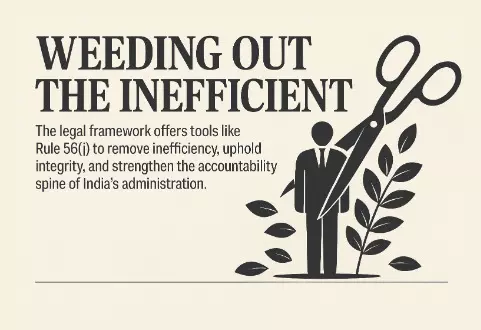Sharper Bureaucratic Edge
Compulsory retirement provisions aim not to punish, but to preserve the vitality of India’s administrative system through accountability and reform

Our legal framework contains several provisions, the judicious use of which can energise the administrative machinery, address inefficiency, and at times even serve as a deterrent against non-performance. The Administration and Courts, in a catena of judgments, have consistently emphasised the necessity of “chopping off dead wood” — that is, removing inefficiency from the system. One of the key provisions in this regard is Fundamental Rule 56(j), which empowers the government to order compulsory retirement in the public interest.
Recently, in Union of India vs. Santosh Kumar Tiwari (2024), the Supreme Court held, inter alia, that compulsory retirement is a well-accepted method of removing dead wood from the cadre without affecting an employee’s entitlement to retirement benefits, if otherwise payable. The Court observed that ordinarily, compulsory retirement is not considered a punishment; however, if the service rules permit it to be imposed by way of punishment, subject to an inquiry, so be it. To keep the Force efficient, weeding out undesirable elements therefrom is essential and is a facet of control, the Apex Court held.
The objective of compulsory retirement is to remove dead wood from the system to maintain efficiency and initiative within the service. Such retirements are often invoked in the public interest to eliminate inefficiency and safeguard institutional standards. They also aim to dispense with the services of those whose integrity is in doubt, thereby upholding purity and accountability in administration.
Government servants, especially younger officers, must know that adverse entries made in their confidential records can be taken into consideration for such orders. Review Committees are often constituted to assess an employee’s conduct and determine whether their continuance in service poses a risk to administrative efficiency or is detrimental to public interest. The overall service record and confidential reports are also considered in such assessments. Thus, government service — though well sought after — must be performed with extreme caution throughout. At no point should privileges be taken for granted. The Apex Court has time and again held that the Government has an absolute right to compulsorily retire an employee in the public interest. Courts have also held that if such an order is passed with genuine intent and in the public interest, an inquiry as provided under Article 311(2) of the Constitution may not be required.
In Union of India v. Col. J. N. Sinha, the Supreme Court held that, as per Fundamental Rule 56(j), the appropriate authority has the absolute right to retire a government servant if it is of the opinion that it is in the public interest to do so. The right conferred on the authority is absolute, though it must be exercised subject to the conditions mentioned in the rule — one of which is that the authority must genuinely hold the opinion that such retirement is in the public interest. However, it is open to an aggrieved party to contend that the requisite opinion has not been formed, or that the decision is based on collateral or arbitrary grounds.
Judicial dicta have also held that compulsory retirement is bound to have some adverse effect on the government servant concerned; however, the rule provides that such retirements can be made only after the officer attains a prescribed age. Under the Fundamental Rules, it has been held that compulsory retirement, passed after a stipulated number of years of service as provided in the rules, does not have civil consequences. The government servant does not lose any rights acquired prior to retirement, and the Government is empowered to energise its machinery and make it more efficient by retiring those who, in its opinion, should not continue in service in the public interest. An employee who is retired in this manner does not generally lose retirement benefits earned during service. Apart from FR 56(j), Rule 48 of the CCS (Pension) Rules also contains provisions to this effect. However, it has been clearly clarified in judgments that an order of compulsory retirement cannot be passed merely to avoid a departmental inquiry for misconduct.
The basic administration of a country rests on the shoulders of its public servants. While their perks and privileges make these positions highly sought after, they also entail significant responsibility and constant scrutiny. It is, therefore, advisable for public officials to exercise utmost caution while discharging their duties. Of course, such provisions must be applied judiciously, as arbitrary or inappropriate decisions can lead to serious liabilities for the concerned department at later stages of litigation.
Views expressed are personal. The writer is a practising Advocate in the Supreme Court and High Court of Delhi



